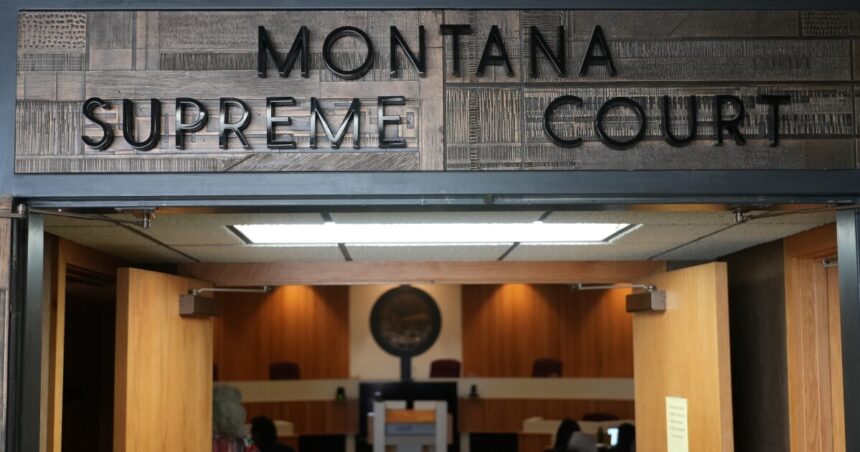HELENA — In recent years, some of Montana’s most hotly contested and expensive races have been for seats on the state Supreme Court, and that trend could continue this year.
Two seats on the court will be open in 2024, as it’s the first time since 2016 an incumbent justice is stepping down from the court.
One of the openings will be for the court’s top position: chief justice. Chief Justice Mike McGrath has been presiding over the court since 2009 but will be retiring at the end of this year.
Three candidates have filed to run for the chief justice position — which doesn’t only preside over Supreme Court hearings, but also comes with additional responsibilities for administering the court and for supervising lower courts across Montana.
The top two finishers in the June primary will appear on the general election ballot in November.
Jonathon Ambarian
The first candidate to announce a run for chief justice was Jeremiah “Jerry” Lynch, a former federal magistrate judge for the District of Montana, working out of Missoula. Lynch, a Butte native, served as a law clerk for federal judge and former Montana chief justice Paul Hatfield. He then spent ten years in private practice before serving as magistrate judge from 2006 to 2019.
Lynch has touted that he’s the only chief justice candidate who has experience as a judge. He says he’s running to defend Montana’s judiciary.
“I’m confident that even though we have disagreements on certain ‘political’ issues, that people understand – the citizens of Montana understand – the importance of an independent judiciary,” he said. “It’s what defends our personal rights: the right to privacy in particular, the right to individual dignity, the right to access to streams, clean air, clean water.”
Lynch has also pushed back against what he sees as attacks on the court, including from political leaders who have accused it of overstepping its role. He said the current Supreme Court justices have been “moderate,” and he criticized the second candidate, Cory Swanson, for saying he wanted to remove political bias from the judiciary.
“I’m not running against anything,” he said. “I’m running for our Constitution, I’m running for judicial independence — which is essential, as I repeat, to our constitutional democracy. My opponent may characterize it as combative; I call it standing up for the third branch of government — period.”
Lynch said claims that the current judicial election system denies the public transparency about judges’ political leanings were “demeaning the intelligence” of Montana voters.

Jonathon Ambarian
Swanson, of Townsend, has served as the county attorney for Broadwater County since 2015. Prior to that, he worked as a deputy attorney general under former Attorney General Tim Fox. In addition, he’s an officer with the Montana Army National Guard.
When Swanson announced his campaign for chief justice, he said he was concerned about what he saw as “judicial activism” in some of the Supreme Court’s recent rulings. He said he wants to bring a more restrained and “judicially conservative” philosophy.
“I do think that there’s some members of the court that do that as well as anyone – and then occasionally you get an opinion where you see some members of the court, it seems like they’ve strayed from really what they should be doing, and going beyond what they should be doing,” he said.
Swanson said the Supreme Court has established guidelines for when it’s appropriate to overturn a law passed by the Legislature, but he questioned whether those guidelines have been followed.
Swanson has also accused Lynch of “pre-judging” certain issues. He said, while he describes himself as politically conservative, that judicial conservatism means not deciding cases based on a particular political outcome.
“My background is mainly as a criminal prosecutor, so I’m certainly going to have a different point of view than someone who maybe spent all their time in business law or other areas,” he said. “That’s the benefit of having multiple members of the court working together and discussing all these things. So this idea that I’m going to just go in and get a scythe and lay waste to prior precedents is complete nonsense.”

Jonathon Ambarian
The final candidate is Doug Marshall, who has been an attorney in Montana for almost 30 years and runs a small law firm, currently with an office in Livingston and previously with one in Helena. He said he’s done criminal defense, often for first-time offenders or young people who are open to addressing the root causes of their problems.
Marshall submitted his candidacy just days before the close of the filing period in March. He said he never woke up wanting to be a Supreme Court justice, but that he decided to run for office because he was unhappy with the tone of politics. He said, despite the nonpartisan nature of judicial elections, he believes politics does seep into them and he wants to offer a different perspective.
“When I get looking at it, I go, ‘You know, we could do this better, we could do that better,’” he said. “And even if I don’t do it, if the other two candidates hear it and they pick up something that I thought or I believed in or I said, then I feel like I win. I mean, that was worth my $1,600 filing fee.”
In fact, Marshall said he is considering voting for Swanson in this race.
“When I talk about who I’m going to vote for, I don’t know,” he said. ”I’m not going to vote for myself just because I’m running.”
In 2019, Marshall was publicly admonished by the Commission on Practice, a panel of lawyers and non-attorney members appointed by the Supreme Court that makes recommendations for discipline against attorneys. In that case, Marshall admitted to charging a client an unreasonable fee and “failure to be diligent” while representing him. Marshall told MTN he acknowledged mistakes – particularly not having a written fee agreement – and has learned from them.





